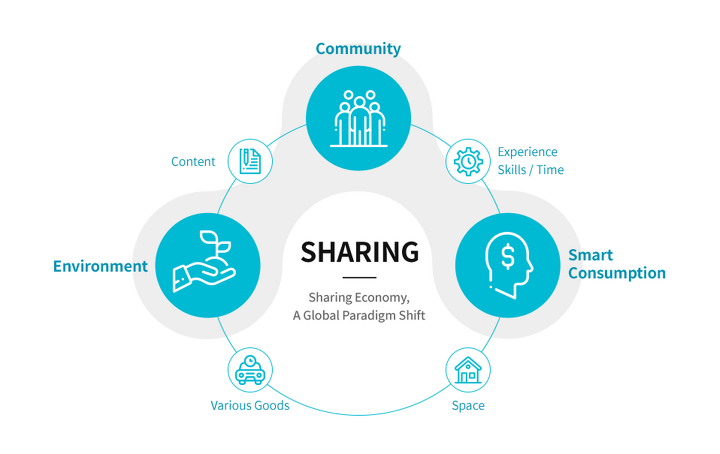List
Story > NEWS > Detail
[News] Economic and Social Values of the Shared Economy
A new type of economy is spreading in the intelligent information society based on information and communication technology. This is the "shared economy" in which idle assets such as vehicles and accommodations between suppliers are traded through ICT platforms. Although transactions between individuals using their holdings are not new to the already familiar culture, the shared economy has emerged as an important pillar of our society as network and the Internet of Things have greatly increased its volume. The economic value of a shared economy is already highly recognized, including efficient utilization of resources, increased consumer welfare and revitalization of the local economy. Also, the cooperative relationships of members of society, and the improvement of social credibility through social interaction, are the core values of the shared economy that we will notice.

However, car sharing and accommodation sharing services, which are representative sectors of the shared economy, have been blocked by legal system or collective resistance from interested parties at the same time as they enter Korea. Even before socializing fully the nature of the shared economy and its inherent value, the domestic shared economy issues seem to have already gone missing. Of course, the legal system cannot keep up with the pace of innovation, so innovation and regulation are bound to be in constant tension. However, the 'statement of regulation to deal with innovation' should be an attitude to actively review existing regulations and absorb them into the institutional domain in response to innovation. Already, major foreign countries, including the U.S. and Europe, are considering the potential of a shared economy, consumer protection, and friction with existing businesses, and are trying to establish themselves within the system with relatively flexible regulations while regulating individual services on a regional basis.

The most notable aspect of the shared economy is the efficient use of idle assets. It also contributes significantly to the environment in terms of increasing the utilization of assets produced once and thereby saving resources by leasing them to others during periods when ownership is not retained. Custom trading of supply-demand via platform increases consumer welfare by providing benefits such as low prices, various options and convenience to consumers, provides additional income sources to suppliers due to low entry barriers, and also has a ripple effect of invigorating the local economy through regional-based shared transactions.
In addition, the important economic value of a shared economy is that ICT technology reduces transaction costs. Many market players' transactions are based on transaction costs, and one of the main functions of the Property Act contract law is to lower the transaction costs. In a shared economy, transaction costs, such as finding a transaction product and exploring whether the transaction is reliable, can be lowered through a post-use, rating, and reliability assessment of the entity accumulated on the shared economy platform. As Ronald Coase, who used transaction costs as an important tool concept, noted that low transaction costs could lead to an exchange of higher value between individuals and eventually to a resource allocation state that maximizes social utility, the shared economy enables the use of resources in a fast and efficient manner through the platform.

Of course, there is a possibility that the reduced transaction costs due to the shared economy will not go away as they are, but will be transferred to other entities. This is because the shared economy could entail various trading risks as an unspecified number of individuals' unorthodox services are traded on a non-regular basis. Transaction costs or external effects due to transactional risks and social stability issues are also a legislative task to be solved in the process of safely establishing a shared economy in the future.
Jeremy Rifkin noted that the exquisite combination of the Internet of Things and the shared economy is leading to a cooperative shared society injury. In fact, although many viewpoints recognize economic value highly as an advantage of a shared economy, it is the key value that we will notice that a shared economy leads to cooperative relationships and social interactions among members of society. This is because a society that used to be personalized and decentralized has been tied to social networks through IT technology, and in a networked, shared society, everyone is now becoming a "peer-to-peer economic collaborator." 'Exchange economy communication' through platform is creating new value in real time. In particular, through these interactions, 'trust' is a social important asset. This is an era in which a trusted society and a low society determine the advancement of the nation.
In reality, a shared economy can be a reasonable alternative to urban social problems related to housing, environment, welfare and transportation, and will contribute to sustainable development of environmental issues such as greenhouse gas, waste and social integration through community recovery.
A new type of economy is spreading in the intelligent information society based on information and communication technology. This is the "shared economy" in which idle assets such as vehicles and accommodations between suppliers are traded through ICT platforms. Although transactions between individuals using their holdings are not new to the already familiar culture, the shared economy has emerged as an important pillar of our society as network and the Internet of Things have greatly increased its volume. The economic value of a shared economy is already highly recognized, including efficient utilization of resources, increased consumer welfare and revitalization of the local economy. Also, the cooperative relationships of members of society, and the improvement of social credibility through social interaction, are the core values of the shared economy that we will notice.

However, car sharing and accommodation sharing services, which are representative sectors of the shared economy, have been blocked by legal system or collective resistance from interested parties at the same time as they enter Korea. Even before socializing fully the nature of the shared economy and its inherent value, the domestic shared economy issues seem to have already gone missing. Of course, the legal system cannot keep up with the pace of innovation, so innovation and regulation are bound to be in constant tension. However, the 'statement of regulation to deal with innovation' should be an attitude to actively review existing regulations and absorb them into the institutional domain in response to innovation. Already, major foreign countries, including the U.S. and Europe, are considering the potential of a shared economy, consumer protection, and friction with existing businesses, and are trying to establish themselves within the system with relatively flexible regulations while regulating individual services on a regional basis.

The most notable aspect of the shared economy is the efficient use of idle assets. It also contributes significantly to the environment in terms of increasing the utilization of assets produced once and thereby saving resources by leasing them to others during periods when ownership is not retained. Custom trading of supply-demand via platform increases consumer welfare by providing benefits such as low prices, various options and convenience to consumers, provides additional income sources to suppliers due to low entry barriers, and also has a ripple effect of invigorating the local economy through regional-based shared transactions.
In addition, the important economic value of a shared economy is that ICT technology reduces transaction costs. Many market players' transactions are based on transaction costs, and one of the main functions of the Property Act contract law is to lower the transaction costs. In a shared economy, transaction costs, such as finding a transaction product and exploring whether the transaction is reliable, can be lowered through a post-use, rating, and reliability assessment of the entity accumulated on the shared economy platform. As Ronald Coase, who used transaction costs as an important tool concept, noted that low transaction costs could lead to an exchange of higher value between individuals and eventually to a resource allocation state that maximizes social utility, the shared economy enables the use of resources in a fast and efficient manner through the platform.

Of course, there is a possibility that the reduced transaction costs due to the shared economy will not go away as they are, but will be transferred to other entities. This is because the shared economy could entail various trading risks as an unspecified number of individuals' unorthodox services are traded on a non-regular basis. Transaction costs or external effects due to transactional risks and social stability issues are also a legislative task to be solved in the process of safely establishing a shared economy in the future.
Jeremy Rifkin noted that the exquisite combination of the Internet of Things and the shared economy is leading to a cooperative shared society injury. In fact, although many viewpoints recognize economic value highly as an advantage of a shared economy, it is the key value that we will notice that a shared economy leads to cooperative relationships and social interactions among members of society. This is because a society that used to be personalized and decentralized has been tied to social networks through IT technology, and in a networked, shared society, everyone is now becoming a "peer-to-peer economic collaborator." 'Exchange economy communication' through platform is creating new value in real time. In particular, through these interactions, 'trust' is a social important asset. This is an era in which a trusted society and a low society determine the advancement of the nation.
In reality, a shared economy can be a reasonable alternative to urban social problems related to housing, environment, welfare and transportation, and will contribute to sustainable development of environmental issues such as greenhouse gas, waste and social integration through community recovery.



